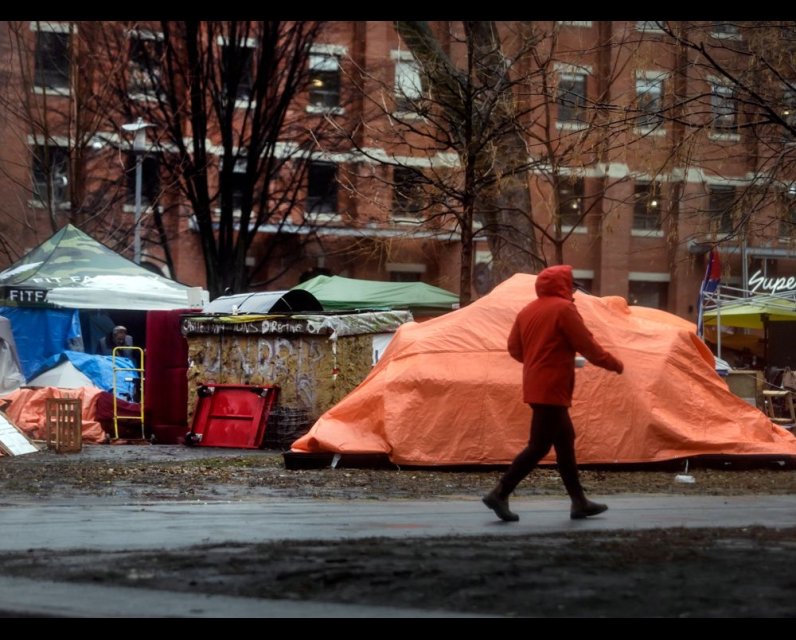Nearly 60% of Canadians support declaring states of emergency to clear homeless encampments: poll

Majority of Canadians (nearly 60 per cent) say they support communities declaring states of emergency in order to clear homeless encampments in parks and public spaces, according to a new poll.
Thirty two per cent of Canadians said they supported the tactic and 25 per cent said they somewhat supported it. “Men are more likely to support or somewhat support these initiatives than women,” according to the Nanos poll, published on Oct. 18. Three out of 10 Canadians opposed or somewhat opposed using a state of emergency to clear homeless encampments. Six per cent said they were unsure.
Canadians living in B.C. were most likely to be in support of removing the encampments, at just over 68 per cent, while residents of the Prairie provinces (Alberta, Saskatchewan, and Manitoba) were a close second, at just over 61 per cent. Residents of Ontario and Atlantic Canada (New Brunswick, Newfoundland and Labrador, Nova Scotia, and Prince Edward Island) were roughly the same, at nearly 57 per cent and nearly 55 per cent, respectively.
“Whether accepted or removed, many communities are grappling and debating what to do,” said pollster Nikita James Nanos, the founder of Nanos Research, in an emailed statement to National Post.
“People from B.C., men and older Canadians are the most likely to be supportive of clearing out homeless encampments in parks and public spaces.”
Meanwhile, people living in Quebec were least likely to support the use of a state of emergency to clear homeless encampments, even though it was still nearly half, at around 48 per cent.
A state of emergency was declared in Barrie, Ont., last month to address encampments, the city said in a news release . The Emergency Act is invoked when there is an imminent threat to public health or safety.
“We are here to help those who want help and there are resources available today. If you refuse that help you cannot stay in these encampments,” said Barrie Mayor Alex Nuttal, adding that he would not allow “lawlessness to take over.”
He said the state of emergency gives the city access to resources for people who were living in the encampments, so they can get shelter or “rehabilitative help.” Resources would also be used to clean up the encampment sites, he said, according to Barrie Today .
In Ontario, Hamilton, Toronto, Ottawa and the Niagara Region declared states of emergency due to the homelessness crisis in 2023 .
There have been arrests, fires, attacks and even deaths at encampments across the country. Sites have popped up in cities like Vancouver, Winnipeg, Toronto and Red Deer and more.
Earlier this month, a child was assaulted while playing next to a park where an encampment was set up in Winnipeg, the city said in a news release . Last week in Toronto, an encampment in the Kensington Market area was cleared, due to concerns about it being a fire hazard, The Canadian Press reported.
In 2022, Vancouver police investigated multiple stabbings at an encampment in Crab Park. In 2024, police said a man fatally stabbed two people at an encampment in Kingston. In 2024, two Toronto women told National Post they had been assaulted while walking near an encampment at Clarence Square .
Toronto Fire Services said a man was found dead in June after a fire at a North York encampment .
Encampments are informal shelters and tents set up by people who otherwise do not have access to housing, according to advocacy group National Right to Housing Network. The group said there has been a major increase in encampments since the COVID-19 pandemic.
Advocates point to Canada’s systemic failure to provide adequate housing as one of the reasons encampments exist. “Meaningfully engaging encampment residents in decisions that affect them, respecting their rights, and finding permanent housing solutions must be the way forward,” said federal housing advocate Marie-Josée Houle in a letter to Canadian premiers in February.
The Nanos poll was commissioned by CTV News. There were 1,052 Canadians, 18 or older, who took part in the survey by phone and online between Sept. 29 and Oct. 1, 2025. The margin of error for this survey is ±3.0 percentage points, 19 times out of 20.
Our website is the place for the latest breaking news, exclusive scoops, longreads and provocative commentary. Please bookmark nationalpost.com and sign up for our daily newsletter, Posted, here.




Comments
Be the first to comment